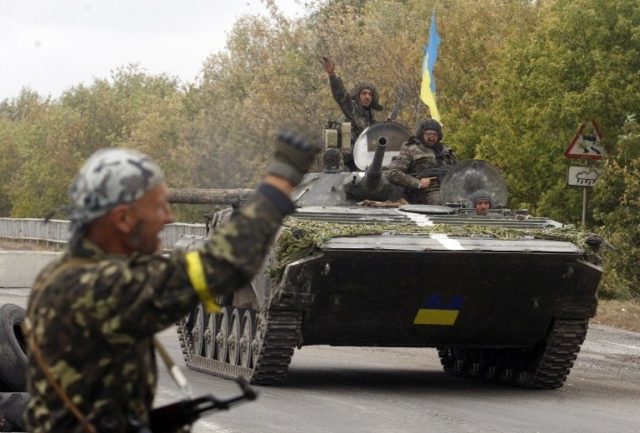
Kyiv Raising the Level, Accelerating the Pace of the Minsk Process (Part Two)
Publication: Eurasia Daily Monitor Volume: 17 Issue: 89
By:

*To read Part One, please click here.
Kyiv has raised its delegation to the Minsk Contact Group from a semi-official level to a full-fledged, senior-level governmental and parliamentary delegation. Kyiv hopes that Moscow will reciprocate in order to accelerate the negotiations and do so, moreover, above the heads of the proxy authorities of Donetsk and Luhansk (see Part One, EDM, June 18).
Ukraine’s move marks a shift from defensive to offensive diplomacy. According to President Volodymyr Zelenskyy’s chief of staff, Andriy Yermak, when adumbrating this shift, “Our conduct will be proactive, Ukraine will come forward as the initiating side, the dominant side in the negotiations” (Ukrinform, May 7). As Foreign Minister Dmytro Kuleba elaborated during the latest Contact Group negotiating round (June 9–15), “We are taking over the initiative, we shall conduct offensive-type diplomacy to impose our own agenda, we shall create situations in which Russia has to react to us, not the other way around” (Ukrinform, June 14).
At the same time, Kyiv is comprehensively challenging Russia’s interpretation of the Minsk “agreements”—the interpretation that has thus far prevailed in the Contact Group and the Normandy processes. The goal of accelerating the negotiations and that of changing the foundation of the negotiations, however, would seem to be potentially contradictory goals. Yermak has attempted to address this potential contradiction after the latest Minsk round: “The people of Ukraine want peace more than anything else. Peace in line with Ukraine’s interests and on Ukraine’s conditions. We are only talking about a peace that would end the fighting, return our territories, return our people” (Levyy Bereg, June 17).
Yermak is clearly also trying to square his president’s electoral promise of a quick peace with the goal of changing the basis of negotiations. Moreover, he seems intent on overcoming his credibility problems after mishandling the negotiations leading up to the December 2019 Normandy summit, accepting the Steinmeier Formula in a Russian reformulation even worse than the German original, and accepting again from Moscow’s hands the project of a „consultative council“ that would have reconfigured the Contact Group to Ukraine’s detriment (see EDM, October 3, 2019 and March 26, 2020). Yermak seemed at a loss for an answer when queried by star interviewer Sonia Koshkina as to the reasons behind his credibility problem (Levyy Bereg, June 17). But, as Oleksiy Reznikov, Ukraine’s policy coordinator regarding the occupied territories, has made clear a number of times since then, “We have forgotten about the ‘consultative council’ and are moving on” (Interfax-Ukraine, June 9).
Ukraine’s official reinterpretation of the Minsk “agreements” has advanced considerably since the December 2019 Normandy summit, when Zelenskyy and the Ukrainian government had collectively announced their intentions to revise that dispensation (see EDM, December 9, 11, 12, 2019). As Moscow invidiously describes it, Kyiv is “rewriting the Minsk agreements by means of drawing Ukrainian red lines” (TASS, June 15). The main reinterpretation concerns the sequencing of key steps: withdrawal of Russian forces, disbandment of the Donetsk-Luhansk unlawful forces, and securing the Ukraine-Russia border in that territory (whether under Ukrainian or international control), to be accomplished in advance of any local elections. This has become Ukraine’s firmly entrenched position by now, reversing the Minsk “agreements’ ” Russian-dictated sequence.
Kyiv’s refusal to negotiate with Donetsk-Luhansk not only remains intact but has acquired an additional supportive argument. In the latest Contact Group session, on June 15, the Ukrainian delegation’s deputy chief, Oleksandr Merezhko, declared (as the Russian side summarized it from the session’s protocol) that the Minsk Two “agreement’s” endorsement by the United Nations Security Council (February 2015) has the character of a recommendation that does not impose any obligations on Ukraine. The Russian delegation’s chief, Boris Gryzlov, retorted that this unprecedented Ukrainian statement “denies the legal basis of the [Minsk] agreements” and “attempts to destroy the negotiating process.” Gryzlov, Donetsk and Luhansk all noted that Kyiv’s view denies its “obligation” to negotiate the political and legal aspects of the peace settlement with the representatives of Donetsk and Luhansk (TASS, June 15, 17; Donetskoye Agentstvo Novostey, June 17).
In the Contact Group’s latest session (held by video-conference, June 10–15), Kyiv again demanded the withdrawal of foreign forces, the disarmament of unlawful formations, and Ukrainian control of the border in advance of any “elections” in Donetsk-Luhansk. And it went further than merely declining Donetsk-Luhansk’s proposal to work out a roadmap toward restoring social-economic ties between “Ukraine and the republics” (Donetskoye Agentstvo, June 17). Proactively, Kyiv called for: restoring Ukraine’s legislation and its monetary and tax systems in the Donetsk-Luhansk territory (where the ruble is now in circulation); ascertaining the situation of Ukrainian state-owned and privately owned enterprises and other economic assets, illegally expropriated by the Donetsk-Luhasnsk “people’s republics”; and ensuring the operation of Ukrainian mobile phone networks on these territories (President.gov.ua, June 10, 15; Ukrinform, June 17).
Kyiv, however, remains ensnared in its acceptance of the Steinmeier Formula (see above). Eager for another Normandy summit, Zelenskyy and Yermak feel bound to incorporate the Steinmeier Formula into Ukraine’s existing law on Donetsk-Luhansk’s “special status,” such incorporation being a precondition to holding the next Normandy summit in Berlin. The delegations from Kyiv and Donetsk-Luhansk exchanged documents about their respective views on this matter at the latest Contact Group session. Moscow and Donetsk-Luhansk demand a more binding version of that clause than Kyiv would allow in the existing, but inoperative, law on special status.



